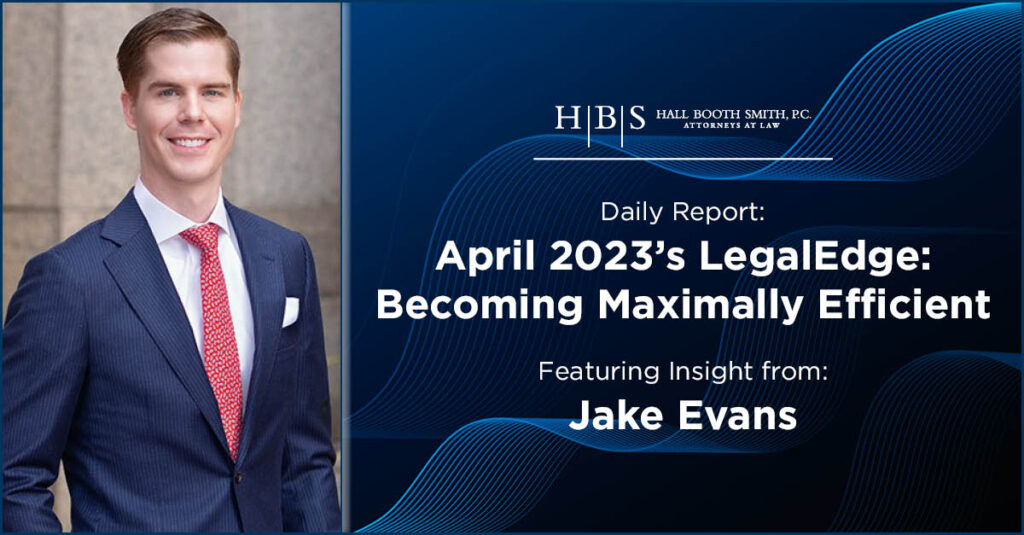
Daily Report: Jake Evans on Improving Workflow Management & Productivity

In a recent article for the Daily Report, Alpharetta Partner Jake Evans provides five tips to help improve workflow management and productivity. That article is below as well as viewable on the Daily Report site.
Introduction
There are the same number of hours in a day for everyone—24. Yet, some get more out of those 24 hours than others. Part of the reason is that they work more. But the other part of the reason is that they work more efficiently.
Taking your practice to the next level requires making your time maximally efficient. And making your practice maximally efficient requires employing and executing time-tested (no pun intended) strategies to get the most out of your time. Below are five tips for improving your workflow management and productivity.
Control Your Schedule. Don’t Let Others Control it For You.
Donald Rumsfeld once said, “Don’t let the urgent crowd out the important.” Every day the world is buzzing and people are clamoring for your time and attention. Resist the temptation to allow them to control what you do and prioritize.
Certain items must take precedence because they are more important, there is a more imminent deadline or both. One of the most important time management tips that I can share is to (1) identify what items must be prioritized and (2) ensure that they are, in fact, prioritized.
Create and Execute Good Systems/Habits.
James Clear in his recent best-seller “Atomic Habits” put it best, saying, “You do not rise to the level of your goals. You fall to the level of your systems.” Our systems dictate how we respond to the world and, in turn, the results that we deliver.
We should focus on relentlessly defining and improving our systems, including how we capture our action items, and how we chose what to do and when we do it. Do you have a system for maximizing your time and freeing up your cognitive load? If not, create one.
Work in Blocks of Time.
Much of legal work requires deep thought and concentration. Drafting an appellate brief, a complex purchase agreement or merely understanding the factual nuisances and legal intricacies of a matter require prolonged focus. It is not possible to absorb the needed information, think through it in a methodical way and reach a strategy without this focus.
Being interrupted periodically will reset the mental progress that you made and, often, will require you to start over. It takes less time to block out one hour of time (or more) to focus on a single project, uninterrupted. As your practice increases in volume, this exercise will become increasingly difficult, but will save you considerable time and will increase the quality of your work. Make it a priority to work on time-intensive projects in at least one-hour blocks of time.
Capture Action Items.
In the current information age, human beings are deluged with data. Lawyers have limitless client demands put on them, and these demands typically involve hard deadlines with significant implications. Even more, partners are expected to manage and grow client relationships. Doing so can involve remembering birthdays, conferences, current events, etc.
While our brains are exceptional at detecting patterns, they are not exceptional at recalling the many to-dos that we have. It is best to capture an important piece of information, especially those involving deadlines, as soon as it touches our minds. This practice not only decreases the likelihood that we will forget this item, but it also takes it off of our mind, freeing it to focus on creatively solving our clients’ most complex problems.
Find Ways to Work in Downtime.
Sometimes, particularly when traveling, we will have smaller windows of work time. These smaller windows may be when we are waiting to board a plane, driving to and from the office or in between client calls. During these short windows, we cannot do the intensive work referenced above, but that does not mean we cannot do anything. Be ready for these times by making a list of items that can be completed in these smaller windows.
Having a list ready saves us from needing to remember what temporally shorter items we have to complete. By trying to rely on our memory, we will waste time and, even worse, resort to the inertia of no action at all.
Improving workflow management is never-ending. And it is subjective and must be tied to your personal preferences and proclivities. These are a few tips to help give you the “LegalEdge” as you refine your time and workflow management.


Leave a comment
You must be logged in to post a comment.